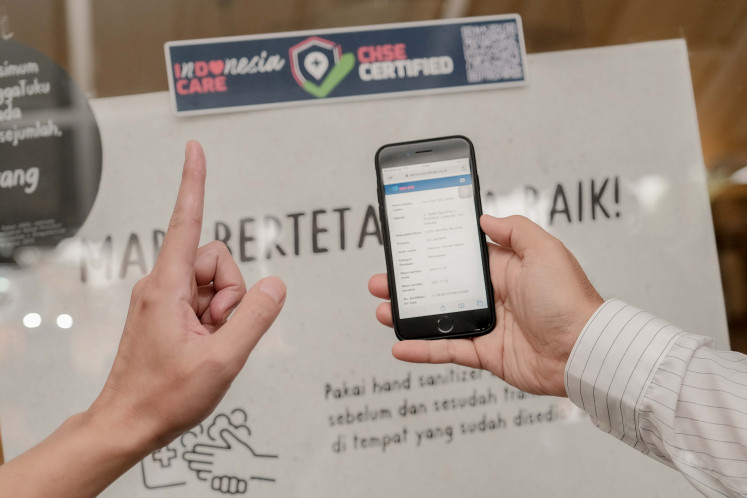Popular Reads
Top Results
Can't find what you're looking for?
View all search resultsPopular Reads
Top Results
Can't find what you're looking for?
View all search resultsTourism sector rejects key policy in revival plan
Business lobby opposes mandatory paid CHSE certification
Change text size
Gift Premium Articles
to Anyone
T
he Indonesian Hotel and Restaurant Association (PHRI), a major tourism business lobby, has objected to plans to make Cleanliness, Health, Safety and Environment (CHSE) certifications mandatory for tourism players – a central part of the government’s strategy for reviving tourism in the country.
Introduced in 2020, the Tourism and Creative Economy Ministry's CHSE certifications seek to standardize and enforce best COVID-19-related practices for businesses in the restaurant, hospitality and tourism sector. The ministry hinted earlier this month that it planned to make the certification compulsory.
PHRI chairman Hariyadi Sukamdani said businesses would be “burdened” if they had to pay for CHSE certifications, which would be made part of the country’s recently revamped online single submission (OSS) business permit system.
“The industry objects because CHSE certification is supposed to be incidental. It is aimed at restoring people’s confidence in tourism, and it is not supposed to be a requirement for a business permit. This would place a financial burden on business players if it were included in the OSS system,” he said during an online discussion on Monday.
Expanding the CHSE certification is a central part of the Tourism and Creative Economy Ministry's strategy to revive Indonesian tourism. Other initiatives include vaccinating hospitality workers, developing five “New Balis”, establishing bilateral travel corridors and reopening Bali to foreign holidaymakers in September. The last two of these have faced setbacks as a result of the Delta variant outbreak.
Read also: Indonesia may reopen to tourists from some countries in October: Luhut
The ministry explored the idea of making CHSE certification a prerequisite for obtaining a business permit during a national coordination meeting on Bali’s planned reopening for international tourism on Sept. 10, according to Tribunnews.
The ministry said the government had paid for some 7,000 CHSE certifications since last year.
“We cannot bear all the costs going forward, but we will make the price more affordable. The government will help [finance] those who need it, such as micro and small businesses,” Tourism and Creative Minister Sandiaga Uno said at a press conference on Monday.
He added that the government would “democratize” the certification process by allowing more than one auditor to conduct CHSE assessments, which were currently monopolized by state-owned surveyor PT Sucofindo.
As CHSE certification would be added to the national COVID-19 surveillance app PeduliLindungi, Sandiaga said, it would become the "gold standard" in the tourism industry.
“We hope that it will be strictly adhered to,” he added.
A man checks his phone at cafe shop Tuku Kopi in Ciepte, South Jakarta on November 22, 2020. The cafe has received the Tourism and Creative Economy Ministry's CHSE certificate. (Courtesy of Tourism and Creative Economy Ministry/-)Several local chapters of the PHRI, including those in Jakarta and South Kalimantan, have also rejected making the paid certifications compulsory.
PHRI Jakarta chairman Sutrisno Iwantono said asking tourism industry players to pay for certifications would be counterproductive as businesses were trying to rebound from pandemic-related financial losses.
He added that hotels and restaurants already needed to obtain a number of mandatory certifications, including business certifications and occupational health and safety (K3) certifications. Adding more, he said, would be burdensome.
Assuming that each CHSE certification cost Rp 10 million (US$700) for hotels and Rp 8 million for restaurants, the government would rake in some Rp 292 billion from the nation’s 29,243 registered hotels and Rp 994 billion from its 118,069 restaurants annually, Sutrisno said.
“CHSE principles have been a part of hotels’ best practices and are already aligned with health standards, food safety management systems and the Occupational Health and Safety Assessment Series [OHSA],” he said in a separate press conference on Monday, as reported by Kompas.
Sutrisno added that the CHSE initiative had yet to have a significant impact on the tourism industry.
Since March, hotel occupancy in Indonesia has shown signs of recovery. In June, the hotel occupancy rate stood at 38.55 percent, higher than the 19.70 percent recorded in the same period last year, according to the PHRI.
However, the July occupancy rate fell to 22.38 percent as a result of emergency public mobility restrictions (PPKM Darurat) as the country battled a second wave of COVID-19 cases.
The latest BPS data shows that 139,000 foreign tourists arrived in July, down 10.8 percent from the same period last year – and one tenth the number from July 2019, before the pandemic struck.
Read also: Tested and testy: Indonesians out for ‘revenge travel’
Andalas University Tourism Study Center head Sari Lenggogeni said CHSE certifications had helped boost tourism confidence and that more establishments should be certified.
“Some people are already confident enough to travel […] CHSE is one of the guarantees, especially in the accommodation industry,” she told The Jakarta Post on Monday.
However, Sari said CHSE certifications were still “partial”, that they had yet to cover vacations from start to finish.
“But over time, hopefully CHSE [policies] can be implemented from the arrival gate to the departure gate,” she added.











